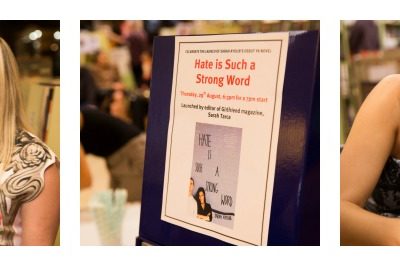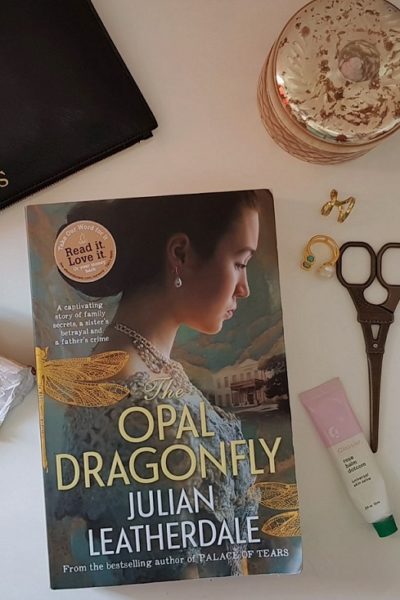[…] This post was Twitted by tiaramerchgirl […]
At the end of May 2009, I was honoured to be a panellist at the Emerging Writer’s Festival in Melbourne, Victoria. I had the time of my life meeting amazing people who loved words and writing more than I could have ever imagined, and who implemented this love in ways I would have never comprehended – zines, comics, speeches, novels, blogs and more. It made me realise that writing for pleasure & profit is never as simple as it sounds, and there’s always a little niche that you could explore to make yourself stand out – and that niche could be as simple as combining your life’s great loves with the written word.
The Panel I was speaking on was called ‘crashing, bashing and smashing through’ and I was freaking out about it, because not only was I the only one who had NOT written a book, but I was also the only one who had actually WRITTEN DOWN a solid speech and planned to recite it there, word for word.
Crashing, Bashing & Smashing Through the preparation for that speech was hard enough, but in the end, I decided that I would put the audience in my shoes so far, and share with them the lessons/advice I thought would be most beneficial to them. To give you a little indication of what was expected of me, I’ll quote the program guide for my panel’s description:
How do writers move forward in their career – finding the time to write, and make money to have the time to write? What are the secrets to breaking down the walls that stop us from calling ourselves a writer? Is it worth having an agent, and how useful is networking?
I ended up getting a little bit of good feedback after the panel, and so I thought I’d share my speech on Wordsmith Lane for those who want to break into writing, and are unsure of where and how to begin. It’s not going to help on its own, but coupled with some regular reading of Wordsmith Lane (blatant self promotion here, I know), you’ll no doubt make it happen. So here goes:
Writing is both my torment and my triumph. Being unable to write plunges me into moodswings PMS just does not compare to, seeing my name in print is the fuel to the fire I have had in me since I was ten years old. It was at that time that I first decided that I wanted to be a writer, and 13 years later, I am still trying to write out that career path, let alone write for it.
When I was younger, I had friends who shared that dream with me. Friends who shared my writing classes with me at university, friends who deliberated with me regarding what article should be pitched to which publication and why. But slowly, one by one, the ability to move forward in that career path, and the ability to move forward in life financially as a result of that career choice, became far too much to bear, and writing the dream (and the dream of writing) was abandoned in favour of more ‘concrete’ career paths: teaching, chiropractics, fashion, PR.
So how do we keep on the dream, the career path, the plan? How do we crash, bash and smash through the barriers? This is something I am still trying to figure out if the goals list taped to my closet door is anything to go by – but I am fortunate enough to have learnt a few lessons along the way. And I am hoping that, by sharing them with you today, you will also be able to write out the career path of being a writer, and crash, bash and smash through everything that stands in your way.
1. Call yourself a writer
If this is what you want for yourself and you are 100% certain of this, then you have made it through the first hurdle of indecisiveness. It is up to you to make the decision of who you are and what you want to do, and whether or not you are published will not change the fact that you can call yourself a writer. This realisation came to me in the very unglamorous spot of a university tutor’s office: I said I ‘wanted’ to be a writer, and she said ‘wanting is not being’. Her advice to me was simple: Call yourself a writer, put together a portfolio and decide where you would write and what rates you would charge. I have been a writer ever since.
2. Showcase your work
Blogspot, WordPress, Typepad, oh my! Embrace these avenues with all your might. Share your writing with the online community and you are well on your way to your next step. Whether it is a blog that will make you a name because it is fantastic in theme and content, or an online portfolio of your published clips/pieces of work – even if they are just from the uni newspaper (which is, FYI, how I started out) – it is one step closer to the dream.
3. Find yourself a mentor
Writing is the most competitive of competitive sports. That article idea is a ball in your hands – how you pass it and to whom requires a planned strategic play that ought to be rehearsed with a coach. When you arejust starting out, the process can be daunting. Find a few writers whose work/career path you find really inspiring and get in touch. It requires some courage, and they might not all get back to you, but it is definitely a risk worth taking. Someone is bound to help you – if it were not for one of the ambassadors present here today, I would have taken double the time on my writer’s journey, and I still count my lucky stars for her and all her great advice.
4. Swallow your pride and network shamelessly
Tell everyone you meet that you are a writer. The whole six degrees of separation thing proves you never know who they are connected to and how. Join writers groups on Facebook, follow other writers on Twitter (and read their bios on their personal websites and blogs), go to writers festivals and forums, and constantly scan websites for information relevant to your style of writing [like this one!]. If you have a blog, create a Twitter account for it and let people know you’ve updated it so they can read your latest. Post links to your online work on Facebook too – anything to spread word. Also check out Author Tracker by Harper Collins to find out where your fave authors are at – it will give you a little bit of an idea about their method, writing life etc. Another thing about swallowing your pride is work experience. I interned in magazines two days a week for two years, and it helped me get my first job. Sure, you start by grabbing coffees and photocopying articles, but a lot of magazines don’t advertise their roles and recruit internally, so being in their face is always a plus. Do remember that even work experience is a competitive market, so put in the hard yards and do not think anything is beneath you. The only way is up, and everyone has to start somewhere.
5. Know the game
It may seem straight forward, but read every submission guideline for every publication you want to write for. If it is a magazine, it’s also a good idea to read its media kit (usually online) because, even if its written for advertisers, it gives you a great idea about who the mag perceives its target reader to be and with this, you can tailor your pitches accordingly. This is as close as you can get to rejection proofing your work. For aspiring novelists, a lot of publishers have information about the submission process, and manuscript guidelines as well as advice, posted on their websites for your perusal. And always spare a thought to joining a writer’s centre. They are an invaluable tool.
6. The importance to figuring out its importance
Finding the time to write is a difficult one if you don’t do it full-time, and doing it full-time can be difficult if you want to live, because often, writing is a labour of love. It is up to you to assess how and when to factor it into your life. It might be setting aside time to write on the train to scrawl ideas, or waking up an hour earlier to write, or locking yourself up all day on a weekend to get some work done. They are all methods that have worked for me, but they might also mean that you will find yourself constantly praying to God for a time machine. Find one that works for you, and if the whole writing thing is important enough, you will find a way to make it happen one way or another.
7. Use it to your advantage
Once you have figured out its importance, and how you are going to work towards it, its easy to use it to your advantage. If you need money to support yourself until your career takes off, use your skill as a starting point. Writing your company’s newsletter will give you copywriting experience – as will preparing background info for launches and products and writing webcopy and the like. This all seems quite boring when compared to the thrill of feature writing or fiction, but they will earn you a rep and soon, the copywriting gigs could be pouring in, possibly freeing you up to freelance full-time/work part-time, and thus, do more of what you love.
8. Be open to the fact that there’s always something to learn
Sure, you might find yourself discussing writing on a panel at a festival, but when one of your topic questions is ‘Is it worth having an agent?’ and you have no idea, then you know you do not have the whole lot down pat. This will continue to ring true because the game keeps going, so stay on the ball and focused on your training.
9. Remember that life is material
And fantastic material it is too! Let every aspect of your life help you crash, bash and smash through the hurdles. Things I have learnt as part of my uni research have formed a niche for my opinion editorials and society features, while a Hate List I wrote in high school has formed the basis for my YA novel. Note that I have no prospect of a publishing deal at present, but the fact that I am not keeping this novel to myself and actually putting it out there just gets me closer to the dream. [Good advice me thinks, considering a YA publisher approached me afterwards and expressed interest in reading my draft]. People who have successfully implemented this include Melina Marchetta (Italian background, Australian home) and Lauren Weisberger (Devil wears Prada, rumoured job as Anna Wintour’s assistant).
10. And finally, when the lords of the publishing industry close their doors, it is up to you to open a window
Every writer faces their share of rejection, often on many occasions. JK Rowling and Marc Cherry (of Desperate Housewives fame) are good examples. You will inevitably face rejection also. But if you think your work is worth it, just keep going at it. Some of my rejected pitches formed the basis of Trespass, the online mag I co-started last year, because I felt that they needed to be out there. That mag has [at that time] now been around for six months, and it enjoys a phenomenal growth in readership as every month goes by. So if this is the life you want to make for yourself, you have to exhaust every possible opporunity to make it happen.
Because while rejection will be your torment, finding a way out of it will be your triumph. And there will be, as I have personally experienced, many an episode of torment and triumph. But getting on with the dream might be that next bit of material for your next fabulous piece of work. And that realisation is your personal silver lining – and what crashing, bashing and smashing through is all about…




 I’m available for school talks, writer’s festivals, writing workshops and other events. Find me
I’m available for school talks, writer’s festivals, writing workshops and other events. Find me 
Sarah this is an excellent article. It answered alot of questions which i was afraid to ask. And save it I will!
This is very inspiring, thank you Sarah 🙂